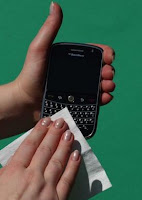 |
| Link to Video Here |
Last month Good Morning America randomly tested a few cell phones for bacteria. Their findings: Yuk!
Using a handheld germ reader, the testers found the average phone harbors more germs than an office desk, a computer keyboard, and even a toilet seat. The report also stated that when you pick up a phone about a third of those germs transfer to your hands and subsequently your face. More than half of the mobile phones tested had virulent bacteria at levels that were considered unacceptable to Environmental Scientist Sheri Carlino who conducted the study. One girl even got a score of 442, which meant that her phone contained something like 100,000 bacteria.
“Researchers have found the flu virus, staph infection, MRSA, and more on mobile phones” reports GMA Consumer Correspondent Elisabeth Learny. “Since so many people handle their phones while they’re eating, those germs have a direct path into our bodies.” Ms. Learny warns virtually all cell phone users are at risk because cell phones have become constant companions and extensions of our hands.
The report states over 295,000,000 Americans currently own a cell phone.
 MobileHygiene.org is tackling this problem one cell phone and smartphone at a time. We are working with infection prevention experts and occupational health and safety professionals to further research mobile usage trends in places such as hospitals, and to promote “mobile hygiene” practices in health care facilities, schools, food handling establishments, and in our homes. If you're department or colleagues are interested in working with us, please reach us by emailing info@mobilehygiene.org.
MobileHygiene.org is tackling this problem one cell phone and smartphone at a time. We are working with infection prevention experts and occupational health and safety professionals to further research mobile usage trends in places such as hospitals, and to promote “mobile hygiene” practices in health care facilities, schools, food handling establishments, and in our homes. If you're department or colleagues are interested in working with us, please reach us by emailing info@mobilehygiene.org.Cell phones, for better or worse, are here to stay. They are incredible tools that impact many aspects of our lives and have reached 4 billion users worldwide. It's smart to take action and clean all the cell phones in your home or workplace, specially your own.
If the correspondents on Good Morning America are talking dirty (they are by their own admission) you can bet you are too.




